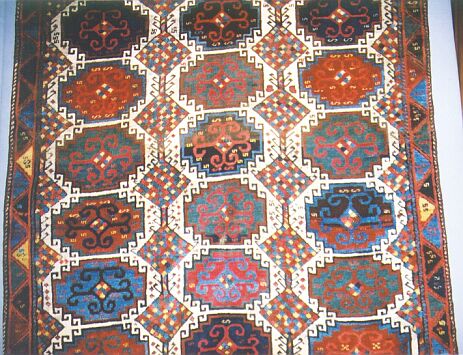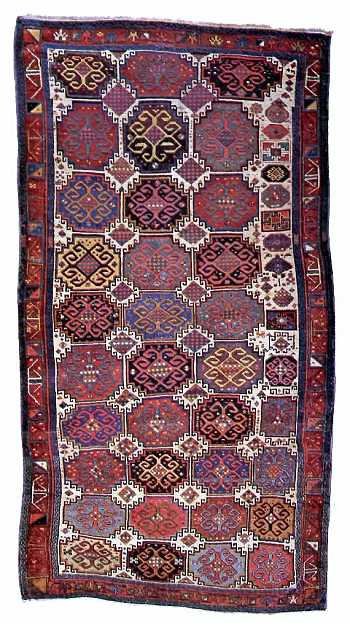Posted by Filiberto Boncompagni on 01-27-2003 05:49 AM:
What about this one?
Dear all,
I couldn’t avoid to remark the similarities between Joe Fell’s
Anatolian (perhaps Kurdish) Memling gul rug :

and this one:

Bennett’s "Caucasian", Moghan
section, plate 206.
This is the caption:
"This is a beautiful
example of the Memlinc gul lattice which, to judge by the asymmetry of the
design, in the right-hand portion of the field, is either the work of a novice
weaver or of a genuine nomadic tradition. The piece has particularly beautiful
colours and is obviously of some age. Mid- to late 19th century. 252 x 137 cm"
I know that the Memling gul is a fairly universal design, so the
resemblance between the two rugs is not terribly surprising. Nevertheless it
makes me wonder how one can establish the provenance of these two rugs? By the
structure, I guess.
Bennett writes:
"In structure, Moghan rugs
differ from most other Caucasian weavings in that a fairly high percentage have
cotton warps and wool wefts. When the foundation is all-wool, the wefts in
apparently old pieces are dyed blue. They are also comparatively finely
knotted-of all the examples for which I have records, and the attribution of
which to Moghan is not in doubt, none fall below 960 per sq. dm (62 per sq.
in.), the largest number have between 1.050 and 1,250 per sq. dm (67 and 81 per
sq. in.) and a not inconsiderable number have knot counts as high as 2,000 per
sq.dm (129 per sq. in.)."
So, what should be the structure of the
Anatolian rug, instead?
Regards,
Filiberto
P.S. - I’m not
particularly fond on structures - on the contrary - but I’m trying to learn how
to sort them out.
P.P.S. - Could Bennett’s one be Kurdish too?
Posted by Steve Price on 01-27-2003 11:17 AM:
Hi Filiberto,
I think the most interesting thing about the one from
Bennett's book is the fairly obvious ongoing experiment on the right hand side
of the field, as the weaver makes a transition from four motifs per width to
three (or vice versa, depending on which end was woven first).
The
colors in Fell's rug appear to be very much better, although the color
reproduction in Bennett's book is not very good and the rug probably looks much
better in person than in the photo.
Regards,
Steve Price
Posted by M. Wendorf on 01-27-2003 12:20 PM:
structure
Hi Filiberto:
Structure yes and also colors, color combinations and
drawing with particular emphasis there on borders, minor and major. This would
be the only way to make a tentative distinction among these powerful rugs.
The Fell rug was also exhibited at Minasian's last year. I do not recall
the structure exactly, but expect it has an all wool construction consisting of
double brown wool wefts and ivory or tan two ply wool warps.
These rugs
are usually assumed to be Kazaks or Moghans implying then that they were woven
by Azeris. A Kazak would be more likely to have red wefts and the Moghan some
cotton as in the Bennett rug. However, Fell's rug and probably quite a few
others may well be Kurdish. In addition to the structure noted above, I would
look for deeply saturated earth tone colors like those on the Fell carpet. I
believe the collector Jim Burns would go further and rely on the diamond and
hooked devices found within or on the stepped polygon device the "memling gul"
which he associates with the Herki.
Thank you, michael wendorf
Posted by Yon Bard on 01-27-2003 04:31 PM:
The Bennet rug is a clear case of 'internal elem.'
Regards, Yon
Posted by M. Wendorf on 01-27-2003 04:54 PM:
Sometimes you are neither up nor down
Hi Yon:
Read which way?
Regards, michael
Posted by Yon Bard on 01-28-2003 09:35 AM:
Michael, read as the picture is shown. True, there is also a 'mini internal
elem' at the top, but the one at the bottom has the expected proportions. And,
although we don't know for sure, coming from a respected book it's likely that
it is shown in the 'correct' orientation.
Regards, Yon

